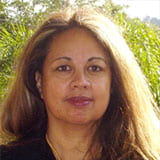CLeaR Fellows 2018 – Dr Melani Anae
I am Who I am: enhancing teaching, learning and research success for Pacific students
 Dr Melani Anae, is Senior Lecturer in Pacific Studies, and Postgraduate Advisor in Pacific Studies, Te Wānanga o Waipapa, at the University of Auckland. She has carried out research and published extensively in her specialty areas of ethnicity, health, education, Pacific research methodologies and Pacific approaches to a broad range of social issues. Her research interests include regional processes of migration, urbanization, ethnicity, and the politics of identity, more specifically focusing on more finely nuanced understandings of transnational identity construction of Pacific peoples and communities in the diaspora. Her work in education focuses specifically on education research methodologies aimed at student learning enhancement to improve retention and success rates for Pacific students.
Dr Melani Anae, is Senior Lecturer in Pacific Studies, and Postgraduate Advisor in Pacific Studies, Te Wānanga o Waipapa, at the University of Auckland. She has carried out research and published extensively in her specialty areas of ethnicity, health, education, Pacific research methodologies and Pacific approaches to a broad range of social issues. Her research interests include regional processes of migration, urbanization, ethnicity, and the politics of identity, more specifically focusing on more finely nuanced understandings of transnational identity construction of Pacific peoples and communities in the diaspora. Her work in education focuses specifically on education research methodologies aimed at student learning enhancement to improve retention and success rates for Pacific students.
“I am Who I am: enhancing teaching, learning and research success for Pacific students”
Despite the excellent Faculty-wide equity provision of Pacific student support services in the form of academic and tuakana mentoring programmes, and allocated tutorial rooms, why is it that pass rates are still comparatively low? Learning to feel at home within the university it seems involves more than these equity/support programmes and initiatives provide. This study is about making culture count. This study examines how the ethnic identity journeys of 25 PACIFIC 300: NZ-born Pacific Identities, students across the duration of the one-semester course define and derive meaning for a more secured ethnic identity as a strategy for success across teaching/learning and researching. The major focus of this project will be to investigate the influential factor of a secured ethnic identity and other influential factors that contribute to Pacific students succeeding well in their studies, and whether the established support initiatives are influential in their success or not. The project aims to ascertain the nature of any trends of teaching, learning (curricula, ethnic identity issues); and utilisation of equity programme patterns which support or constrain success. It calls for strategies, changes to environments, teaching/learning communities and curricula that allows students to think, write about and act on their ethnic identities to support Pacific success and assure its continuance. The results of this study will also call for and set the scene for a larger project that will incorporate all Departments/Faculties within the University.
The outcome of the study will be a piloted professional development opportunity for all University academic staff to attend and from there findings from the study will be disseminated, discussed and developed in workshops. It will be held at the Fale Pasifika, Pacific Studies, with feedback extracted from staff evaluations of the usefulness of the workshop.